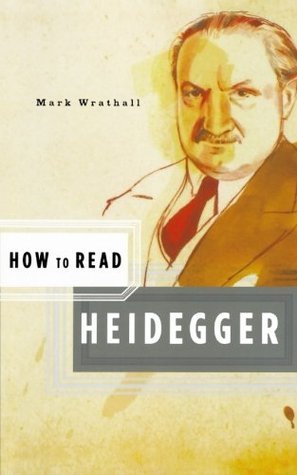What do you think?
Rate this book


144 pages, Paperback
First published April 17, 2006
It starts with Dasein (sein: being, da: there). Each of us is Dasein. Dasein are capable of taking responsibility according to the way they exist in the world. Non-Dasein things (like benches, tables, etc) do not exist but it does not mean that there are no such things. Their mode of being differs. Authentic Dasein has the ability to decide for itself on its own being. There can't be a Dasin without a world, nor a world without a Dasein and what Dasein is can be only read off the world as it acts in the world. A world is a genuine phenomenon in its own right and can't be reduced to a mere collection of physical objects. The world is the ``wherein'' of our active understanding. Being-in-the-world involves ourselves in the world in a particular way. We have a ``there'' that is a meaningfully structured situation in which to act and exist. Heidegger describes understanding as a ``projecting upon possibilities''. He means that we understand something when we grasp the possible ways that it can be used on the possible things that can happen to it. Interpretation is ``the working-out of possiblities projected in the understanding''. The real question is not, ``are there others'' but rather ``can I be myself?'' For it turns out that, at least in the everyday existence which immediately structures my world, my essence is not dictated by me, but by others. That is called the ``dictatorship of the one''. Like other existentialists, Heidegger thought that we have no option but to begin philosophical inquiry from a reflection on our current situation -- our existence. Death individualized Dasein down to itself. Thus is a way in which my situation is disclosed for existence. When we orient our lives towards death, we find our existence wrenched away from the `they', because we recognize that shared conventions or norms will ultimately fail us. Anxiety in the face of death brings us a joy. The world makes paths that direct our decisions but that is not all. It also establishes norms according to which some decisions are more important than others. Some options more praiseworthy than others.
The existence of other worlds, worlds destroyed by the modern for mastery and control, shows that it is not a natural and self-evident proposition that the world should be organized in such way as to maximize control.
The essence of language according to Heidegger is the `saying' that shows things, 'language speaks by saying, that is, by showing... language speaks in that it, as showing, reaching into all regions of presences, summons from them, whatever is present to appear and fade'.
Traditionally, essences are understood as static, unchanging properties. For Heidegger, which properties are essential will depend on how the Heideggerian essence has oriented us to the world and thus what is essential about a thing can change historically because different ages and cultures might `essenced' differently.
Origenary language speaks by disposing us to the world lined up and organized in accordance with a particualr way of being. Orgineray language does not use words as linguistic expressions because it is not concerned with telling us facts but rather with getting us fell the world in a particular way. We speak because we are possessed by language, which means we are oriented to things and regions of the world in a particular way. As a result, different originary languages that ordinary languages end up being different as well.
If we come to experience everything as a mere resource, our ability to lead worthwhile lives will be put at risk. When someone disposed to the world in a technological way encounters human beings, she sees human resources the good human is the one most flexibly able to deal with shifts in the marketplace, pluralities of cultures, change in social norms, etc. Premodern technologies adapted themselves to the inherent properties that things had. Modern technology, by contrast, is `a setting in order that challenges forth the energies of the nature.' In a technological world, we feel free to use anything is any way we please, but correspondingly, there is no reason why we need to do anything. Everything becomes contingent and shallow, every action a meaningless expression of a whim. The real danger is that technology will deprive us of our essence as human beings. The possibility that we might become mere resources is an even more dangerous consequence of technology than weapons of mass destruction. Heidegger thinks that all the technological time-saving devices meant to free us for truly worthwhile pursuits, actually lead to modern lives lived in a mood of profound boredom. This boredom gives rise to an incessant appetite for constant busyness, saturated with amusement and entertainments. The boredom, Heidegger believes is a symptom of our failure to feel at home with the technological world. Heidegger's answer to technology is not nostalogic but rather allowing ourselves to be conditioned by our world.